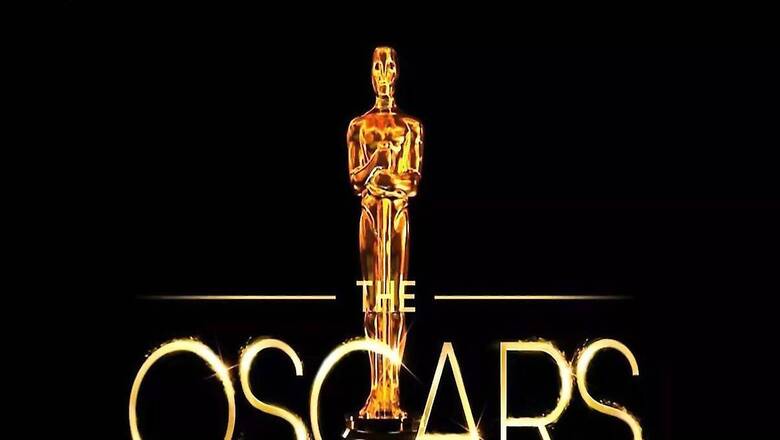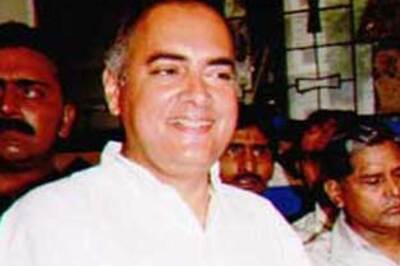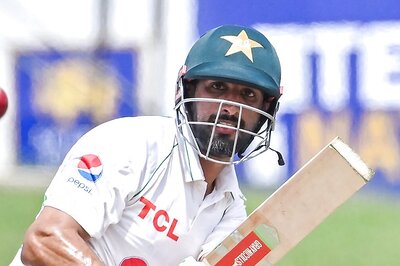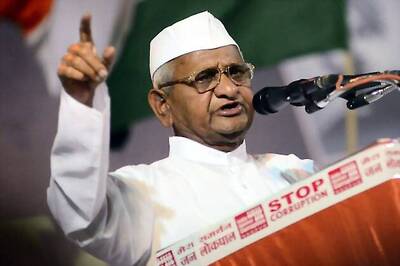
views
There has been great pride and joy at ‘Naatu, Naatu’ winning the Oscar for the best original song. Our congratulations go out unreservedly to the music composer, MM Keervani, the director, SS Rajamouli, and the two actors, Ram Charan and NT Rama Rao Jr whose turbo-charged dance in the song made it an international hit. The award has genuinely brought joy to millions of Indians.
The entire Parliament, in a rare show of unity, congratulated the makers of the film. But it is interesting, that Jaya Bachchan, herself an iconic part of the film industry, while joining others in the Rajya Sabha to felicitate the winners, also asked a pertinent question: when will we have our own desi Oscars? When will winning an award given by an Indian jury become the yardstick for success for Hollywood filmmakers, like winning an Oscar is for Indians?
I think that, even as we legitimately celebrate RRR for its international success, this is a thought we should ponder about. For millennia, Indian civilisation was the yardstick for excellence which other parts of the world sought to emulate. Why is it today that India, and Indians, become euphoric by the West’s endorsement of our achievements? Is it a colonial hangover, or an acceptance that the ultimate success of our creative endeavours will be judged only when we receive the West’s recognition?
This tendency is not new. The musical genius of Ravi Shankar became apparent to most Indians when he was feted in Europe and America and the Beatles came to hobnob with him. Satyajit Ray became an Indian icon only after he was recognized in the West as a legend of world cinema. Even the lyrical brilliance of Rabindranath Tagore was given full recognition within India after he won the Nobel Prize for literature in 1913. More recently, Geetanjali Shree won the International Booker Prize, and her book, Ret Samadhi, translated as Tomb of Sand, hitherto relatively neglected, began to top the Indian bestseller lists. The examples are endless.
The film Slumdog Millionaire is a case in point. After the film won the Oscar in 2009, the nation went hysterical, with banner headlines announcing the ‘victory’. Very few paused to judge the merits of the film or recall that this was not an Indian film at all. The producer of the film was British, and it had been entered for the awards as a British film. True, some Indians, who were part of the film’s team, won Oscars: AR Rahman for the music, Gulzar for the lyrics; and Resul Pookutty for the editing. However, most people would agree that although Rahman is a brilliant musician, his score for Slumdog Millionaire is far from his best. Similarly, Gulzar’s genius as a poet is hardly reflected in ‘Jai Ho’, the song that won the Oscar. The film itself was entertaining but not extraordinary. Yet, such was the euphoria generated by the Oscars, that a critical appraisal of the film’s merits — which happened in plenty in the West itself — was almost considered unpatriotic.
Undoubtedly, the Indian film industry has considerably gained in confidence and popularity, including abroad. This is a matter of pride. But it is also true that very few of the thousands of films made every year are of quality, and a great many are straight lift-offs of Hollywood films. Innumerable websites give graphic details of this plagiaristic orgy. To mention just a few: Akele Hum Akele Tum is a copy of Kramer vs Kramer; Dhammal is a copy of Rat Race; Salaam Namaste is a copy of Nine Months; Kaante is a copy of Reservoir Dogs; Main Hoon Na is a copy of Never Been Kissed; Baazigar is a copy of A Kiss Before Dying; Phir Hera Pheri is a copy of Lock, Stock and Two Smoking Barrels; Bunty Aur Babli is a copy of Bonnie and Clyde; Chachi 420 is a copy of Mrs Doubtfire; and, the opening train sequence of Sholay, a film that is universally celebrated as a watershed in popular Indian cinema, is a frame-by-frame lift from the 1950s classic, Northwest Frontier.
Even in film music — the distinguishing feature of Indian films — plagiarism is not unknown. The popular composer duo Shankar Jaikishen did not bat an eyelid when taking Elvis Presley’s ‘Who makes my heart beat like thunder’ to fit the song ‘Kaun hai jo sapnon mein aaya’. Even a discerning music composer like Salil Choudhary did not think it was wrong to set the song ‘Itna na mujhse tu pyaar baddha’ to Mozart’s Symphony No 40. Of course, composers like Anu Malik and Bappi Lahiri have taken this plagiarism malaise to new heights, and even justified it.
This is not to put a dampener on our genuine happiness at the success of RRR. But Jaya Bachchan’s question is relevant too. When will the Golden Peacock that we award at our International Film Festival in Goa, have the same value as the Oscar? Filmmaker and critic Pan Nalin once asked an important question: ‘If the Italians invented neo-realism in cinema, the Germans expressionism, the French new wave, then what did we invent?’. Nalin concludes: ‘Indian cinema will be global only if it takes root in Indian soil and then grows like a banyan tree spreading roots in other countries. Ages ago, our stories were universal. If not, a child in Indonesia would not be watching the Ramayana today. Our stories were timeless’.
For a civilisation that was once the global foundation of creative excellence, this is a valid observation.
The author is a former diplomat, an author and a politician. The views expressed in this article are those of the author and do not represent the stand of this publication.
Read all the Latest Opinions here



















Comments
0 comment